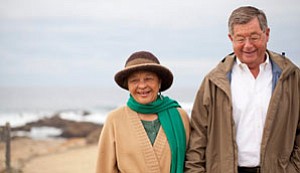BALTIMORE — For Fred and Ann Jealous, there is a strong belief that love has the ability to move mountains. And, in their case, love also has helped them overcome terrible odds and obstacles, none the least was the unpopular for its time, interracial marriage.
Ann, a black woman, and Fred, a white man, met in Baltimore in America’s mid-20th century Jim Crow and Civil Rights era.
This week, the pair, parents of Maryland gubernatorial candidate Ben Jealous, renewed their wedding vows at the St. James Episcopal Church Lafayette Square, where it was illegal for them to get married in 1966— such a union would have resulted in a prison sentence.
The vow renewal ceremony was timed to be commensurate with the 50th anniversary of the June 12, 1967 Loving v. Virginia Supreme Court decision, which legalized interracial marriages.
Like Mildred and Richard Loving, the couple whose case for marriage was taken all the way to the Supreme Court, Fred and Ann were married in Washington, D.C., as it would have been illegal in their home state of Maryland.
In 1966, the couple said they were afraid to hold hands in public. At the movies, they entered separately and met in the middle of a darkened row. Because of the existing anti-miscegenation laws, Ann didn’t consider Fred as a potential husband. They wed, however, one year before the Supreme Court deemed anti-miscegenation laws illegal in 1967.
“We would identify two empty seats when we’d go in a movie theater on a date,” Ann Jealous said. “He would walk down one aisle, I would walk down the other, and we’d meet together but we would not look like we were sitting together,” she said.
Fred Jealous, a native of Maine who had served a teaching assignment in Turkey, said he was smitten with Ann, who at the time served in the Peace Corps.
“I proposed three times,” Fred Jealous said, noting that they were married in August 1966— 51 years ago.
Ann Jealous said she initially thought Fred’s proposals were “crazy.”
“I thought, ‘this is against the law,’” she said.
Each said they didn’t suspect the problems that would confront them as an interracial couple.
“I grew up in segregation,” said Ann Jealous, who is counted among the first African-American students to attend Western High School in Baltimore. “So, it didn’t occur to me to think of Fred as a potential mate.”
After their wedding, they drove back to West Baltimore, from Washington D.C., in a Cadillac followed by a row of cars with their lights on.
Rather than receive the usual celebration enjoyed by so many newly married couples, people on the road pulled aside and removed their hats because they thought it was a funeral procession. Fred’s family disowned him, and he relinquished a hefty inheritance, knowing that “no amount of money would ever be equal to the love [he] had for Ann,” he said.
The passion of his parents led Ben Jealous’s drive to become the youngest president in the history of the NACCP, at just 35 years of age, he said.
It was there that he helped abolish the death penalty in Maryland, played an instrumental role in passing the DREAM Act, and in homage to his parents he helped see marriage equality for all people become a reality in Maryland.
Still, while Fred and Ann have overcome segregation and other obstacles, and have raised a son who is now running for governor, they credit the couple whose Supreme Court case opened the door to interracial marriages in the United States.
“If that law had not been changed, we would not be anywhere near where we are now,” Ann said.
